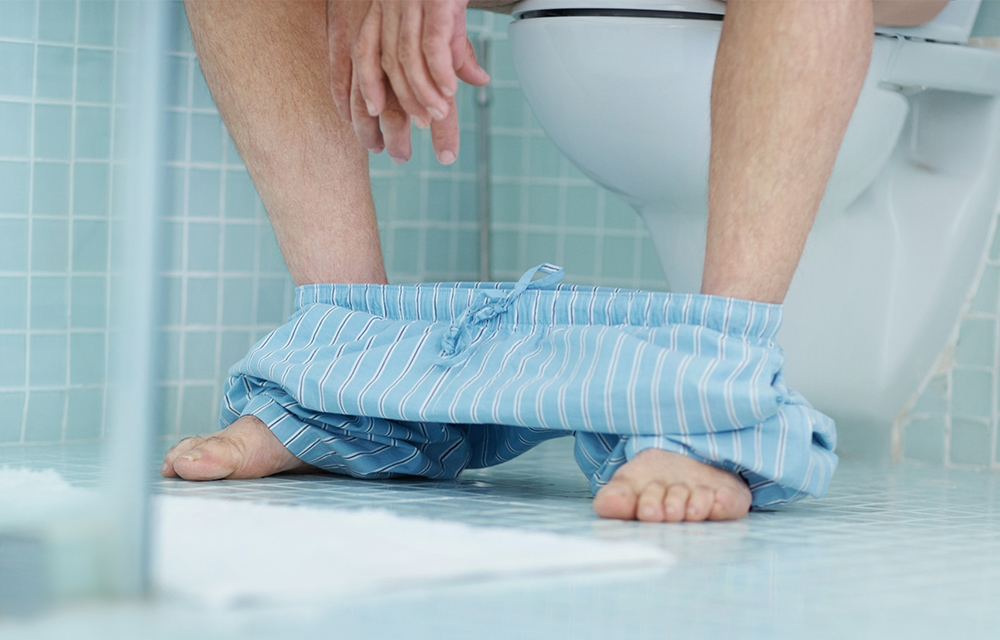
There’s no doubt that cutting back on carbs while loading up on protein has definitely helped plenty of people shed pounds. “Protein is great for anyone trying to lose weight. Since it’s digested slower than carbs, it helps you to stay full and satisfied after your meal,” says Torey Armul, R.D.
That said, one common downside of going high-protein is that it can also leave you a bit, ahem, stuffed up. The good news is you don’t have to grin and bear down if constipation is an unpleasant side-effect of your protein-packed diet.
RELATED: Man Has 13 Kilos of Faeces Surgically Removed After ‘Being Constipated Since Birth’
Here’s what’s going on below and what you can do about it.
Why Does Your High-Protein Diet Make You So Constipated?
If you’re feeling stopped up, it’s what you’re not eating that’s messing with you.
“It’s not the protein but a lack of fibre that causes constipation,” says Armul. “People eat less fibre on a high-protein diet since they’re more focused on eating animal proteins, which don’t have any fibre at all.”
RELATED: White v Brown: Science Has Finally Confirmed Which is Healthier For You
Fibre, which is found mostly in fruits, vegetables, and grains adds bulk to your stool, drawing water and waste through your GI tract. That, in turn, helps ensure the foods you eat move more efficiently right on through.
“By keeping things moving, fibre keeps you feeling good, reduces bloating, and removes any potential irritants in the GI tract,” says Armul.
What You Should Do If You Can’t Poop
Your best bet is to make sure you chow down on high-fibre foods regularly. To get the biggest bang for your nutritional buck, Armul recommends munching on plant-based proteins like lentils, chickpeas, edamame, black beans, and kidney beans. “It’s a double-whammy. You’re getting protein, but you’re also reaping the benefits of fibre,” she says.
That said, if you’re going low-carb and generally avoiding legumes, which have more carbs than animal protein, it is still possible to stay regular by filling up on lower-carb vegetables. Keep your count the lowest by choosing produce that’s highly water-based, says Armul. Good options include dark leafy greens (spinach, kale, and Swiss chard are nutrient powerhouses), zucchini, cucumbers, tomatoes, squash, green peppers, and broccoli. Asparagus is an especially good pick since a cup of the stalks also have about three grams of protein, she adds.
Seeds and nuts like chia seeds, flax seeds, peanuts, almonds, and walnuts are another smart choice because they offer a heavy dose of fibre and protein with few carbs.
As for fruit, you’ve probably already heard it’s good for keeping you regular, though you might be steering clear because it’s also higher in carbs. But consider adding a regular dose to your diet. “I tell my clients not to worry about the natural sugars in fruits because they contain a lot of fibre that’s satiating,” says Armul. However, she says a good rule to follow for a low-carb, high protein diet is to pick fruits with a higher ratio of skin-to-pulp (like blueberries). These have a lot more fibre and less carbs than other fruits sans skin (like watermelon).
The Best Way to Stay Regular
To keep from getting constipated, aim for about 25 grams of fibre per day, spread out evenly between each meal. Ideally, filling half of your plate with vegetables, a quarter with an animal protein (chicken, beef, fish, etc.), and a quarter with a high-protein grain or legume (like quinoa, chickpeas, or lentils). Since one cup of leafy greens has around five grams of fibre, a robust salad at lunch loaded with spinach, peppers, and tomatoes should get you halfway there.
At the same time, make sure you chug more fluids. “Fibre pulls water from your body, so up water intake as you eat more of it,” says Armul “I recommend carrying a water bottle throughout day.”
Eight cups of water per day is a good place to start, but increase from there if you feel thirsty or constipated. The best indicator that you’re drinking enough is the colour of your urine: If it’s light like lemonade, you’re good to go.
The article originally appeared on Womenshealthmag.com.













